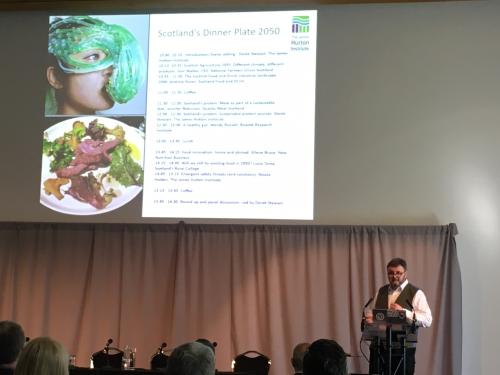Leading industry and SEFARI science representatives from Scotland’s food, drink and agricultural sectors came together to discuss and speculate what Scotland’s dinner plate may look like in 2050.
Through a series of presentations at the Dynamic Earth on the 14th May 2019 the speakers identified what is needed to ensure that Scotland will maintain and build on its diverse, nutritious and sustainable food and drink products. The topics discussed encompassed a wide range of topics including; protein sources (meat, plants, fish and insects), future agriculture, the industry landscape and innovation and the implications for Scotland’s health and food safety.

Stage
Directory of Expertise
Purpose
Food and drink production is of major importance to the economic and societal wellbeing of Scotland and our trading partners. However, despite being thought of, and promoted as, a land of premium quality food and drink we have a poor diet and a high incidence of associated diseases such as Cardiovascular Disease (CVD), type II diabetes and certain cancers.
Scotland Food and Drink(SFD), the industry lead organisation, is tasked with driving responsible growth in the sector and building Scotland’s global reputation as a Land of Food and Drink. Consequently SFD has set out a short to medium term strategy for growth in Ambition 2030. This encapsulates the shared vision for sectoral growth and the requirements including innovation, from sources such as the Scottish Government Strategic Research Portfolio (SRP), including skill development needed to achieve this.
Delivery of the Ambition 2030 strategy is on track, but a longer-term view needs to be developed for this sector with the impact of consumer-driven changes and other pressures that will impact on the diet and economy of Scotland determined. Some of these factors include the impact of climate change, the increase in flexitarian lifestyles (including less, but higher quality meat, more plant and potentially insect protein in the diet), policies to reduce food waste and add value to food processing coproducts as healthy ingredients.
SRP led or supported innovation is seeking to lead the way in helping to formulate what will be our diet in 2050 and investigate the potential impact of these innovations on the health and wealth of Scotland. To start this process we brought together leading scientists and industry representatives to set the scene with their vision for the future.
Results
The meeting presentations outlined where Scotland is in terms of food and drink production and included speakers from National Farmers Union Scotland (NFUS), Scotland Food and Drink (SFD) and Quality Meat Scotland (QMS) identifying the value of Scottish primary production and the need to face the challenges ahead.
At the farming level the need to adopt innovations such as drones, autonomous agribots and algae as animal feed was identified whilst the case for meat in the diet was convincingly delivered by QMS. They identified that red meat consumption is falling but that meat is still an essential and nutritious component of the diet.
The change in our diet in terms of portion size was also discussed and the change in portion size from 1940-2019 (see picture) astounded the audience and this was accompanied by a presentation from the Rowett Institute on what a healthy diet should look like in terms of the protein balance (meat and plant-derived), fruit, vegetable and starch sources.
Food waste was a timely topic also discussed and this identified that there are solutions to reducing waste at the producer supply chain and consumer levels. Furthermore, options for valorizing waste to create economic opportunities was identified.
Food safety is implicit in the Scottish supply and value chain and the integration of new technologies as part of a broader risk monitoring and assessment portfolio was also presented as a way forward.
Finally, examples of food and drink innovation were presented, and this identified clear shifts in UK eating habits with 96% of people eating between meals and 10% of snackers eating to replace a meal. This direction of consumer travel and the product examples highlighted identified significant scope for Scottish industries to innovate in the food and drink product space based around our well-respected primary produce.
Benefits
The workshop, funded by SEFARI Gateway’s Responsive Opportunity Fund, can be viewed as a success. The presentations from stakeholders across the industrial and academic landscape identified that the industry is in good shape but that there are several challenges to be faced at the political, economic, environmental and consumer levels.
It is clear that the implications of climate change can offer opportunities in terms of new crops, e.g. protein crops, but that weather extremes make crop agriculture challenging. Greater engagement with the SEFARI institutes was suggested to develop adaptation and/or mitigation strategies.
The meat vs plants debate was addressed and it was highlighted that this trend shows little sign of changing but that meat is bought by 99.2% of all households and QMS are building on this with the message of “eat less eat better”. Allied to this the proliferation of plant-based alternatives already on the market identified significant opportunities for Scottish agriculture and food and drink sectors. Co-constructed collaborative projects between industry and the SEFARI institutes would accelerate this and possible inform the next SRP.
Scotland’s has a recognizable food and drink brand and it is crucial we protect this, and the presentations identified that in the areas of food safety and waste the ongoing activities are supporting this. More significant strides can be made in these areas through further industry collaborative research. This would support the significant consumer shift to diet diversification and plant products whilst identifying opportunities for waste valorization.
All the presentations identified the impactful working relationship between the SRP and multiple stakeholders and will be used as a guide for future SRP activities.
Project Partners
Scott Walker, CEO, National Farmers Union Scotland
Andrew Niven, Strategic Market Intelligence Manager, Scotland Food and Drink
Jennifer Robinson, Health & Education Manager, Quality Meat Scotland
Allene Bruce, New Nutrition Business